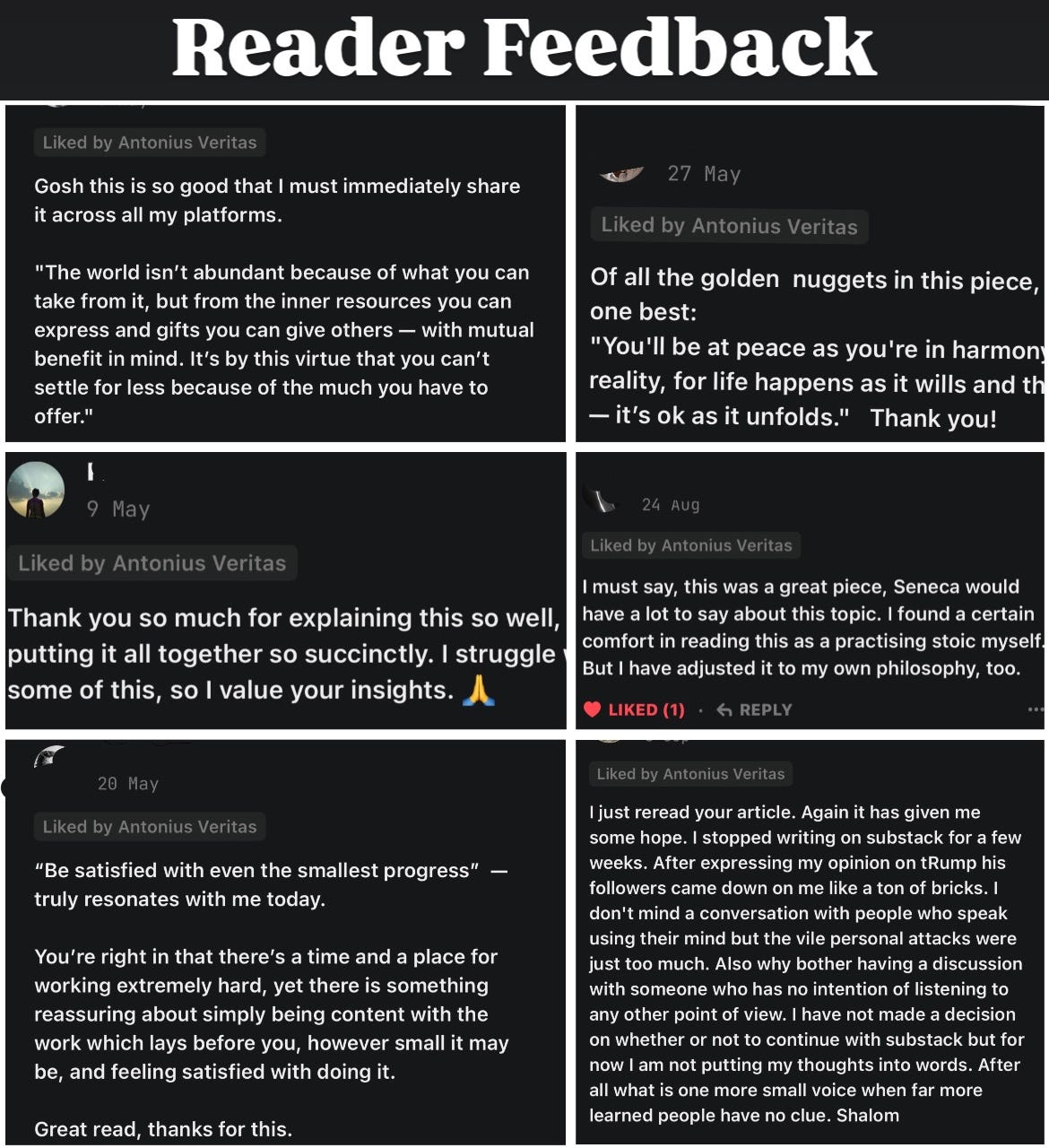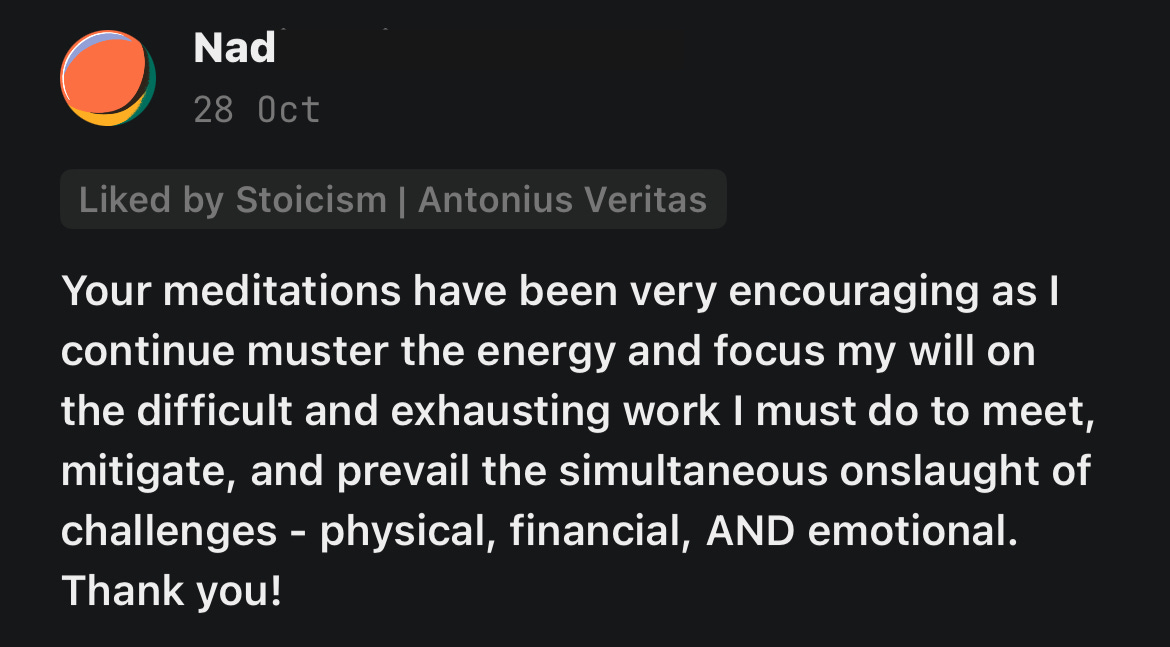XXXXIV. Be Lazy
Take the shortest route, the one that nature planned.
Last chance! The 25% Black Friday discount for this publication ends in less than 9 hours.
Mark Normand’s comedy special ‘Out to Lunch’ inspired today’s post.
He blithely mentions how he’s too lazy to be bothered by some happenings in the world.
He just lives his life and has fun.
I’d love to help you achieve the same state of mind through the Stoic lens.
The following story is known as The Frog & the Mouse as adapted from Aesop’s fables.
A young Mouse in search of adventure was running along the bank of a pond where lived a Frog.
When the Frog saw the Mouse, he swam to the bank and croaked:
"Won't you pay me a visit? I can promise you a good time if you do."
The Mouse did not need much coaxing, for he was very anxious to see the world and everything in it.
But though he could swim a little, he did not dare risk going into the pond without some help.
The Frog had a plan.
He tied the Mouse's leg to his own with a tough reed.
Then into the pond he jumped, dragging his foolish companion with him.
The Mouse soon had enough of it and wanted to return to shore.
But the treacherous Frog had other plans.
He pulled the Mouse down under the water and drowned him.
Last time we got into the benefit of first tending to our gardens.
We talked about how it's neither good nor bad that the internet has globalized our world.
There are many benefits of this interconnectedness.
We can learn from experts all around the world.
We get to help people on a large scale.
However, the dark side of the internet is we risk playing into the arms of bad actors with no other intention but to make us react and farm our attention.
The web isn't solely culpable.
Neither is the news.
In the real world, gossip, trolls, foolish and rude people, minding other people's business, and political smoke screens are the norm.
We tend to give the little things more attention than they deserve then we wonder why we haven’t made progress on our day’s objectives.
Why, in spending our time replying to dumb people and brooding over what trolls say, our spouse feels neglected and estranged because we’re not paying attention to them, sharing banter, deep conversations, and bringing positive energy to our hang-outs.
Why we feel like shit when we look at other people’s lives and compare them to our own.
Hence, it's prudent to be lazy to click clickbait, react to inflammatory rhetoric.
It’s good to be too lazy to pay more attention to other people’s lives — in a way that makes us feel bad about ours rather than picking what will help us achieve equal if not more success.
We don't have to participate in the latest trend.
We can look at the people with less than us to combat envy and feel the immense joy of gratitude overflow within us.
We don't have to react and give our opinion on weightless matters over the longterm.
Or those that don’t affect the common good.
“You don’t have to turn this into something.
It doesn’t have to upset you.” — Marcus Aurelius
We don't have to criticize anyone for their beliefs, sexuality, gender or religion.
I know it’s hard, but we can mind our business and live. It’s madness to try to change people.
We don't have to know everything about what a person did to us, as if it would change our decision concerning who they are.
We can choose to be ignorant about some actions so we can start the process of moving on.
Marcus Aurelius wrote to himself,
“Someone despises me.
That’s their problem.
Mine: not to do or say anything despicable.
Someone hates me. Their problem.
Mine: to be patient and cheerful with everyone, including them.
Ready to show them their mistake.
Not spitefully, or to show off my own self-control, but in an honest, upright way.”
Other times, for our sanity and to conserve our energy, we don't have to look deep into matters — a sly comment prompting us to think we're being manipulated, fearing loss when someone close to us gets sick, a small mishap drifting our thoughts into worthlessness and devastation.
We can deal with the nature of what we see as it superficially is without extrapolating the worst because we're confident nothing can hurt us.
“Nothing but what you get from first impressions.
That someone has insulted you, for instance.
That — but not that it’s done you any harm.
The fact that my son is sick — that I can see.
But “that he might die of it,” no.
Stick with first impressions. Don’t extrapolate. And nothing can happen to you.
Or extrapolate. From a knowledge of all that can happen in the world.” — Marcus Aurelius
Don’t get me wrong.
Sometimes we need to look deep into matters to understand them and ourselves in the process.
But it’s wise to stick to first impressions on most things.
As we’ve reflected before, don’t worry or suffer more than necessary.
We can choose peace and happiness — to fan the flame of our relationships and ambition because our days are numbered and it's foolish to waste them on rage, sadness, and nonsense.
What matters most is if we're doing our part.
If we're practicing virtue, fulfilling our purpose in the world, and being kind to each other.
You have to tell yourself you don’t have time to pursue any of the other useless things.
“A key point to bear in mind:
The value of attentiveness varies in proportion to its object.
You’re better off not giving the small things more time than they deserve.” — Marcus Aurelius
Be lazy to pick fights and criticize people because it only steals a tremendous amount of energy, isn’t fun, ruins your mood, and doesn’t help you.
On the other hand, it serves your ambition to be magnanimous.
We can let people live as they like while discerning those open to truth and gently teaching them the main reason why we're here, why we’re human.
“What can even the most vicious person do if you keep treating him with kindness and gently set him straight — if you get the chance — correcting him cheerfully at the exact moment that he’s trying to do you harm.
“No, no, my friend. That isn’t what we’re here for. It isn’t me who’s harmed by that. It’s you.”
And show him, gently and without pointing fingers, that it’s so.
That bees don’t behave like this — or any other animals with a sense of community.
Don’t do it sardonically or meanly, but affectionately — with no hatred in your heart.
And not ex cathedra or to impress third parties, but speaking directly.
Even if there are other people around.” — Marcus Aurelius
Be lazy to chase the wind everyone else runs after because it doesn’t quench your need for happiness as the mirage might compel you to imagine. Beware those things might even enslave you.
Be temporarily lazy, as Paul Graham wrote, to fold your clothes, clean the house, the utensils, so you can focus on the business idea or project you want to create.
Be too lazy to play status games. You’ll never win.
Be too lazy to be desperate, to reach out for what you don’t have, and focus on what you can control and influence.
Let the chips fall where they may — you don’t need much to be happy.
To fortify and augment your power, conduct yourself, as Epictetus told his students,
Do you like this meditation so far? ⭐️
Support the publication to read the rest and access 100+ premium essays & meditations.
Here’s what other readers are saying…




